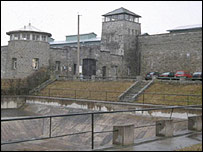|
By Nick Caistor
BBC correspondent in Argeles
|


Half a million fled when Franco's forces defeated the Republicans
|
The mountains of the Pyrenees are shrouded in thick cloud. Occasionally, the wind blows the clouds away, to reveal snow-covered slopes.
But down on the beach at Argeles, the wind only makes the rain sweeping across the beach seem even more icy, and the grey sand even greyer.
About 100 people, a few of them in their eighties, the majority middle-aged, have come to Argeles for a ceremony that takes place every year at the end of February.
They are commemorating a defeat that led to the mass movement of people across borders in a way that became sickeningly common in the following years.

The Spanish Republicans hoped for a welcome in France
|
They are the survivors and relatives of Spanish Republicans.
Some half a million of them fled across the high passes of the Pyrenees in February 1939, when Franco's forces finally broke their resistance in Barcelona and the north of Spain.
They thought that France, a fellow Republic, would receive them as heroes, or at least welcome them as idealists who had fought for shared beliefs.
The reality was very different. As Vincent, a spry 85-year-old tells me, to this day he cannot forget how when he and his companions were marched through the French mountain villages, there was complete silence.
All the inhabitants hid indoors, watching the "reds" from behind twitching curtains.
Beach ordeal
Worse was to come. As many as 100,000 of the Spanish refugees were herded down onto the beach at Argeles.
In the summer now, thousands of tourists come from all over Europe to enjoy the sun, the sand and the Mediterranean way life.
But in February 1939, the Spaniards were left in the open air in freezing cold, with no shelter at all.
 There were bloated dead bodies everywhere - mounds of destroyed vehicles and guns There were bloated dead bodies everywhere - mounds of destroyed vehicles and guns 
Former refugee Jose, describing the scene at Dunkirk
|
Jose, another lucid man in his eighties, tells me they were treated like animals:
"On one side there was the freezing sea, on the other barbed wire six feet high. For days we weren't given any food or any kind of shelter. I had to dig a hole with my hands in the sand and drink sea water to survive."
Before the situation improved by the summer of 1939, up to 10,000 of the refugees had died.
War trauma
To many of the men, the best choice seemed to accept the offer of joining the French army.
When war was declared in the autumn of 1939, thousands of the young Spaniards were sent to the Belgian and Italian frontiers to help strengthen France's defences against the Germans.

The Germans sent several thousand Spaniards to Mauthausen
|
Jose was one of the unlucky ones. When the Germans invaded France, he was caught up in the chaotic retreat to the beaches of Dunkirk.
As he starts to talk about his experiences, his face comes alive as he relives the days spent on that other beach.
"It was the biggest mess you can imagine," he says.
"There were bloated dead bodies everywhere. Mounds of destroyed vehicles and guns, planks of wood, metal - and everything was covered in a layer of sticky oil."
Jose was unlucky once more. He was not taken off by the flotilla of boats that crossed the English Channel for the Dunkirk rescue.
Instead, he was captured by the Germans.
Imprisoned
Together with several thousand other Spanish survivors, Jose was again interned, this time in a labour camp.
But, he says, whereas the British and French soldiers were respected, it was a different story again for the Spaniards.
They were rounded up and sent off to the infamous camp at Mauthausen.

Franco stayed in power until 1975
|
"When we were all inside the gate, the camp commandant got up and gave a speech," Jose remembers.
"He told us: 'You have come in through the front gate, the only way you are going to leave is through that gate' - and he pointed to the crematorium chimney at the far end of the camp."
Other Spaniards who stayed behind in the south of France faced similar dangers.
Some, like Vincent, escaped from their camps and became some of the first Resistance fighters.
They helped smuggle Allied airmen back across the passes of the Pyrenees into neutral Spain.
Disappointment
When the Allied armies landed in France in 1944, they helped liberate many towns in the south of France.
But Vincent, like many other Spanish refugees, had to face one more huge disappointment.
He was convinced that, after defeating Hitler and Mussolini, the Allies would turn their attention to Franco.
So Vincent and several thousand more crossed back into the remote north of Spain to establish a bridgehead and wait for French, British or American reinforcements.
None came. Not only that but the returning Republicans were greeted with suspicion by their fellow countrymen, who did not want any more battles.
So Vincent's return to Spain lasted less than a fortnight.
Since 1945, he and hundreds of thousands of Spaniards have remained in France, gradually adapting to life there, but never able to forget that they, like so many of today's asylum seekers, were treated as outcasts and terrorists.
